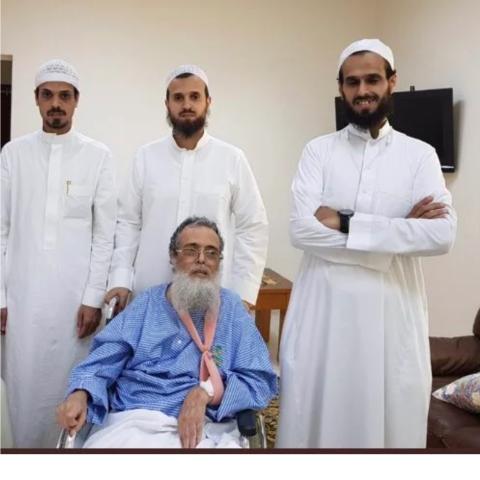
At its last session, the UN Working Group on Arbitrary Detention (WGAD) examined the case of Saudi religious figure Safar Al Hawali, who has been arbitrarily detained since his arrest by state security agents in July 2018. His arrest followed the publication of his latest book, "Muslims and Western Civilization", in which he criticised the international policies of the royal authorities and made recommendations to them.
In their Opinion, the UN experts stressed that the arrest of the scholar and his family members was in retaliation for the publication of his book. They expressed grave concern at the fact that he has now been detained for five years without trial and that he has been denied access to medical care and to accommodation as a person with a disability.
A collective punishment of an entire family for peaceful criticism of the royal authorities
Safar Al Hawali, his sons Abdullah, Abdulrahman, Ibrahim, and Abdulrahim, and his brother Saadallah were all arrested by the authorities between 11 and 13 July. Safar Al Hawali and his son Ibrahim were arrested on the morning of 12 July when State Security officers arrived in an ambulance and raided their home in the village of Hawala. Safar Al Hawali was blindfolded and both he and his son were taken to an unknown location.
Alkarama stressed that these arrests are a direct consequence of Safar Al Hawali's critical outspokenness against the authorities and constitute a form of collective punishment. Al Hawali had recently published a 3000-page book entitled "Muslims and Western Civilization", in which he criticised the Saudi royal authorities’ foreign policies while offering recommendations.
Furthermore, the arrests came in the wake of a wider and unprecedented crackdown on freedom of expression, which began in September 2017. Since then, hundreds of public figures have been targeted, including scholars, academics and human rights activists, most of whom have been arrested solely for expressing criticism of government policies.
In its Opinion, the Working Group also urged the Government “to ensure that Mr. Al-Hawali’s relatives do not suffer any reprisals for his activities or for the exercise of their own rights”. The experts have expressed their concerns to the Saudi authorities which did not contest Alkarama’s allegations over the harassment and reprisals against the Hawali family, “in particular the alleged arrests of family members as a form of punishment for his activities”.
WGAD’s call for immediate and urgent measures to ensure the release of Safar Al Hawali
Since his arrest, Safar Al Hawali has been held in inhumane conditions, denied access to a lawyer and, after more than five years in detention, his case is still considered 'pending' by the Saudi authorities. The scholar is being held de facto in indefinite pre-trial detention without any care, in what amounts to a slow-motion execution.
Furthermore, Safar Al Hawali is disabled; he has a fractured pelvis and has previously suffered a brain hemorrhage. As a result, his lower body movements are impaired and he has facial paralysis.
Alkarama, therefore, took his case to the WGAD and the Committee on the Rights of Persons with Disabilities (CRPD), which is also examining the scholar's conditions of detention.
In the Opinion, the WGAD experts reiterated that they were "gravely concerned that Mr. Al-Hawali remains in detention over four years after his arrest, in particular as he is a person with a disability". The experts stressed that since his arrest he has been denied regular contact with his family and has not had access to legal representation. They, therefore, urged the authorities "to take measures to facilitate communication between Mr. Al-Hawali and his family and legal counsel".
In conclusion, the Working Group urged the Government of Saudi Arabia to release Safar Al-Hawali immediately and as a matter of urgency, particularly as the scholar's life is at high risk in detention in the context of COVID-19. Alkarama submitted the WGAD's opinion to the CRPD, urging the treaty body to also call for the immediate release of the religious scholar.
